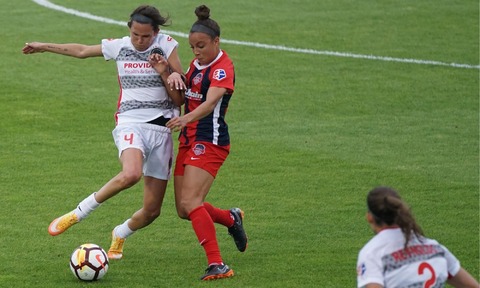Trials tackle if menstrual cycle contributes to women’s soccer injury
5 May 2025

Football governing body FIFA is funding Kingston University to research whether the menstrual cycle is a contributing factor to a dominant injury in women’s sport.
Anterior cruciate ligament (ACL) damage is common in males too but particularly frequent among female athletes and especially soccer players.
One of the four key ligaments sited in the knee, it links the thigh and shin bones (femur and tibia) and is susceptible to sudden movement caused by stopping hard, jumping or switching direction.
Notable casualties have included English player Beth Mead, the Netherlands’ Vivianne Miedema and Australia’s Sam Kerr.
Now, with the support of a FIFA research scholarship, Kingston PhD student Blake Rivers will analyse hormone concentrations in blood samples collected from women footballers in the south west London areas playing at elite and grassroots level.
Professionals playing for top clubs Chelsea and Fulham will be among those participating in the year-long research project.
Rivers, together with Kingston University sports science academics, Drs Simon Augustus, James Brouner and Michelle Richards, will test concentrations of female hormones linked to increased ligament laxity and decreased neuromuscular response times.
These will be analysed against performance data and assess any relationship between menstrual cycles and risk of ACL damage.
Research team member Dr Augustus stated: “We know hormones fluctuate during different phases of the cycle but we don’t yet know how much of an influence that may have on the risk of injury.
“We’re attempting to help those individuals who injure their ACL outside of impact actions – those are the ones where we might have more chance to intervene and prevent them from taking place by utilising strength training or tweaking technique.”
Interest in the impact of ACL injury within women’s sport has been ongoing for many years, acknowledged Augustus.
In 2023, Andrea Tartaglia of the Isokinetic Medical Group, recognised as a FIFA Medical Centre of Excellence, addressed the matter at the Isokinetic Football Medicine Conference.
Tartaglia, managing director of of Isokinetic London, stated there was “an epidemic of ACL injuries that has sidelined many stars and sparked fear among players”.
Adding that the exact reasons for higher ACL tear rates in women vs men were still a matter of debate, she estimated that 40% of incidents repeated within five years.

